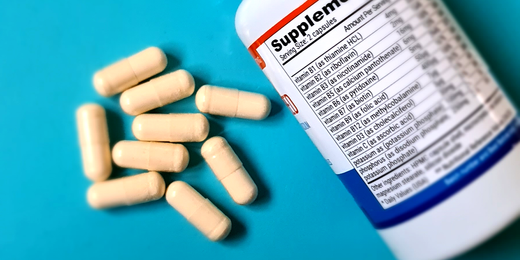Do You Need Multivitamins While Fasting?

Are multivitamins necessary during fasting? This is a question that we see often. It’s a reasonable concern, especially if you are new to fasting.
The short answer is that most people can fast without multivitamins. The body knows what it’s doing, and it is super efficient when it comes to maintaining a proper balance.
But there’s a little more to it than that, so let’s take a look.
Vitamins and Minerals During Fasting
It’s important to understand the difference between minerals and vitamins while fasting.
Minerals are inorganic salts like sodium, potassium, magnesium and phosphorus. Most of these salts are also electrolytes because they play a role in conducting electrical signals by your body’s systems.
Minerals get depleted within days of fasting which is why you should always take your electrolyte supplements while fasting.
Vitamins are organic substances present in foods. They don’t get depleted anywhere near as quickly. It could take weeks and even months before you get to the point of having to supplement.
Fat-Soluble Vitamins vs Water-Soluble Vitamins
Vitamins A, D, E, and K are fat-soluble. They are stored in fat tissues. As we lose the fat with fasting, those vitamins are released and the body can access them.
Water-soluble vitamins B and C are also stored in our body tissues. One interesting point to note about them is that the body uses these vitamins to assist the digestive system and nutrient metabolism. These processes work very differently during fasting so you use up a lot less of this type of vitamins.
Are There Exceptions?
Yes, there are of course situations where you should really consider taking a multivitamin during your fast.
Pre-existing vitamin deficiencies
If it’s been identified prior to fasting that you have low levels of certain vitamins, a multivitamin can protect you from becoming deficient.
Some of us are not even aware of any potential deficiencies until we try to fast and then get hit with symptoms associated with vitamin deficiencies.
Hair loss is one unfortunate side effect that can sometimes occur. It’s usually easy to fix with a strong Biotin supplement, or a specialist formulation such as our Hair Defence.
Vitamin prescriptions
If your doctor has prescribed vitamins for any reason you will need to continue those, or talk to your doctor about stopping them while you are fasting.
Ultra-long fasts
People who do really long Extended Fasts (30 days and longer) or do multiple fasts frequently might be more prone to becoming deficient. In those circumstances, the safest way would be to get your vitamin levels tested to ensure that you are not running deficient.
How Will I Know if I Get Low on Vitamins?
Again, most people will have enough stored in their body to sustain a fast. But here are some symptoms you can watch for that might indicate you are becoming deficient:
- Vision problems
- Fatigue or weakness despite taking electrolytes
- Poor immune system function - frequent colds or infections
- Brain fog
- Depression
- Wounds that won’t heal
Always check with your doctor if you have a concern.
What If I Still Want to Take a Multivitamin During My Fast?
You are of course free to do that. Many people choose to do so just for the peace of mind.
Make sure that you get a product that’s zero-calorie and free from sugar and junk fillers, so that it doesn’t interfere with your fast.
Please also note that some vitamins, especially C and E can cause stomach upset when taken without food. Some vitamins require food in the gut or a little bit of fat in order to be absorbed.
You can take a little fat (heavy cream, butter, etc) with your vitamins to help prevent stomach upset and for better absorption. A tiny bit won’t break your fast.
Important Note for Extended Fasters!
If you fast for 14 days or more, you will need to supplement B-vitamins during your refeed phase, starting at least 30 minutes prior to breaking your fast.
This helps to prevent Refeeding Syndrome, a dangerous complication that can happen after a long fast.
While it’s unusual to have the full-on Refeeding Syndrome after a controlled voluntary fast, a milder form of the same symptoms are quite common, for example, fluid retention and digestive upset. Supplementing B-vitamins and Phosphorus can help to prevent these symptoms.
The longer your fast is, the more important it will be for you to plan and support your refeed phase. Our Fasting Refeed was designed precisely for this purpose.
Conclusion
Taking a multivitamin during your fast is sometimes necessary, but most people will do fine without any.
Whether you are doing an Extended Fast, or Intermittent Fasting, eating whole, nutritious foods when you refeed will help to ensure you have enough stored vitamins for your next fast.
Always listen to your body and check in with your doctor if you experience any symptoms of a vitamin deficiency during your fast.

